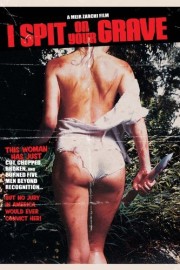I Spit on Your Grave
Originally, I wasn’t going to write about this film; it was intended to be just another notch on my mostly annual October horror marathon. But I was barely an hour into the film when I decided I had something to say about this film. Of course, part of it is because I never want to watch it again.
First of all, let me say that while I, mostly, agree with Roger Ebert when he says, “It’s not what a movie is about. It’s how it’s about it,” I think there are exceptions. This is one of them. From a filmmaking standpoint, it’s not appallingly inept like “The Room” or “Troll 2,” but the story isn’t worth telling. It’s offensive to men, and– of course –to women, and while writer-director Meir Zarchi claims he had good intentions in making it, none of that comes through on-screen.
For those who aren’t aware, the film starts with a young writer (Camille Keaton) going out to a cabin in the woods to get some work done. On the way, she stops and asks directions from hillbillies at a gas station. Not smart. It’s not long before she’s being stalked and tormented while she’s trying to relax. One day, she is attacked, and brutally raped by a group of four men, one of whom is mentally challenged. Again and again, they keep coming at her, and emotionally brutalizing her, in addition to the physical abuse. She is left for dead. Miraculously, she survives, and cleans herself up. Two weeks later, she’s ready for revenge.
I want to say that I understand why Zarchi and his collaborators made this movie– in a way, it’s ideal ’70s exploitation subject matter. Actually, it was, when the movie was Wes Craven’s “The Last House on the Left,” which managed to make us feel uncomfortable about the act of rape itself, but understanding of the actions afterwards, in part, because it was the parents who took revenge. Part of what makes “I Spit on Your Grave” so disturbing is the way Jennifer, the writer, lures the men who raped her before she kills them. She leads on the mentally challenged one, and even lets him inside of her, before she hangs him. She takes a bath, and manually pleasures, another one before cutting his manhood off. The other two she kind of just kills, albeit brutally, but the pleasure she seems to take in these deaths is unnerving. The psychological change in her is understandable given the horrific things she had done to her, but to exploit that change for the purpose of entertainment is difficult to accept. Of course, it’s also hard to swallow that she would be physically able to function enough, two weeks later (without any medical help, it appears?), to do what she does, but honestly, that’s almost a moot point given the rest of the story.
This is a film without a moral compass. This is a film that wants to be one thing (and indeed, it has received praise, inexplicably, as a feminist parable), but ends up just being disgusting. We learn very little that allows us to get into the heads of any of the characters, making it impossible. What the gang did to Jennifer is awful on every level, but what Jennifer does is no better, and in some ways, might be worse. How anyone thought that this film needed to be remade, as it was in 2010, is beyond me, other than the only reason anything gets redone in Hollywood…money. Of course, all the money in the world can’t prevent this material from being morally bankrupt.










